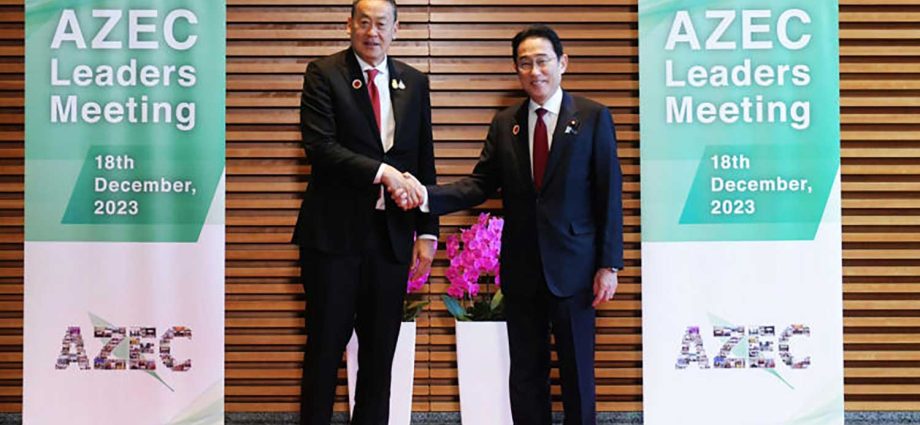Megaproject was the focus of visit to Tokyo

The government is considering granting a 50-year concession to the bid winner of the one-trillion baht Land Bridge megaproject, which is expected to begin turning a profit within 24 years.
The terms were discussed by Transport Minister Suriya Jungrungreangkit as he joined Prime Minister Srettha Thavisin in wooing Japanese investors at the “Thailand Landbridge Roadshow” event in Tokyo, Japan.
Mr Suriya said the bid winner will be granted a single 50-year concession covering shipping lines, logistics, port management, property development and managing industrial investments.
“A new law will be enacted to facilitate the development of the surrounding areas based on a cost-benefit study. It is anticipated to break even in 24 years,” he said.
Given Thailand’s geographic location and comprehensive transportation network, the country is well positioned to become a logistics hub, making the Land Bridge a good investment opportunity, said Mr Suriya.
He said the scheme, which connects Chumphon on the eastern coast along the Gulf of Thailand to Ranong on the Andaman Sea, will reduce journey times for goods and cut logistics costs by bypassing congestion in the Malacca Strait.
Addressing the roadshow event attended by representatives from nearly 30 leading Japanese companies, Mr Srettha said the Land Bridge will be an alternative for feeder ships when traffic in the Strait of Malacca is expected to exceed its capacity in 2030.
The scheme will cut transport times by five days and save at least 4% on logistic costs for goods moving from Japan, China and South Korea to Southeast Asia, Central Asia, and the Middle East.
It will also save three days and at least 4% on logistics on routes between eastern China, Taiwan, Vietnam and the Philippines and Southeast Asia, Central Asia and Middle East countries.
Trade between Thailand, Laos, Cambodia, Myanmar and southern China and the Philippines, Indonesia, Central Asia and Middle East countries, can also expect a significant boost with shipping taking 14 days less and saving about 35% in costs.
According to Mr Srettha, on average the Land Bridge scheme will cut transportation time by four days and save about 15% on logistics across all sectors with about 33.2 million containers utilising the Land Bridge, or about 23% of all containers passing through the Strait of Malacca.
“If the Land Bridge is used for distribution of crude oil in the region, it can reduce costs by at least 6%,” he added.
Mr Srettha said the project is expected to create at least 280,000 jobs for Thais and help the country’s GDP to expand by 5.5% per year when the project is fully operational.
“I have confidence and I’m inviting Japan to join this unprecedented opportunity to invest in this commercially and strategically important project for joint economic growth,” he said.
Initiated by the previous government to drive the economy, the Srettha administration approved its continuation in October.
Comprising deep-water ports in Ranong and Chumphon, a motorway and a railway system supporting both freight and passenger transport and a pipeline network, Mr Suriya said he had discussed opportunities to collaborate on transport during a bilateral meeting with the Japanese Minister of Land, Infrastructure, Transport and Tourism, Saito Tetsuo.
The issues included rail network development under the Mass Rapid Transit Master Plan in the Bangkok Metropolitan Region (M-Map), a 20-year plan for developing primary and secondary public transport networks (2010-2029).
On aviation, he said Thailand and Japan expect to expand aviation cooperation further when the third runway at Suvarnabhumi airport is open. Once the new runway is operational, the airport can accommodate up to 2,800 flights per week, allowing Japanese airlines to increase flights.
According to government spokesman Chai Wacharonke, the prime minister was satisfied with his visit and meetings with the Japanese business community.
On his X (formerly Twitter) account, Mr Srettha said the visit went very well and his invitation for the Japanese investors to invest in Thailand was well received.

